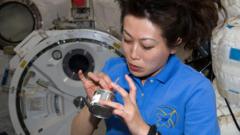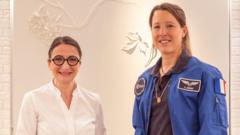In a groundbreaking development for space exploration, a mission just launched aims to assess the feasibility of growing lab-grown food in space, specifically tailored for astronauts. This initiative, led by the European Space Agency (ESA), signifies a pivotal step toward addressing the challenges of food supply in low gravity and high radiation environments encountered on the International Space Station (ISS) and beyond.
As the quest for human interplanetary travel intensifies, the need for sustainable food sources becomes apparent. Currently, providing food for astronauts can cost upwards of £20,000 per day, making it financially impractical for extended missions. Dr. Aqeel Shamsul, CEO of Frontier Space, emphasizes that establishing food production capabilities in orbit and potentially on the Moon is central to reducing these costs. "Our aspirations include building factories in space that could manufacture food essentials, from protein-packed mashed potatoes to elaborate meals," he stated.
The innovative concept characterizes lab-grown meals as not merely a novelty but a necessity. Current food supplies for astronauts consist primarily of freeze-dried meals, which lack the variety and appeal that could promote better nutrition and morale. The new method involves growing food components—proteins, fats, carbohydrates—in controlled lab environments, replicating natural food sources without the need for traditional agriculture.
The experiment recently launched aboard a SpaceX Falcon 9 rocket features a compact bioreactor designed to produce these food ingredients in space. Researchers hope to gather data on how these processes can adapt to the unique conditions of space and determine their viability for prolonged missions, such as potential habitats on Mars.
The food product created thus far, however, is described as unappetizing, which is where culinary innovation comes into play. Jakub Radzikowski, Imperial College's master chef, is developing recipes using alternative ingredients while awaiting regulatory approval to incorporate lab-grown components. His approach aims to provide comfort and familiarity for astronauts from diverse global backgrounds, showcasing the potential for replicating various cuisines even in zero gravity.
Feedback from experts, including the UK’s first astronaut, Helen Sharman, has been encouraging. She noted the possibility of lab-grown food playing a significant role in catering to astronauts' dietary needs during extended missions. Enhanced nutritional profiles could directly address the unpredictable changes astronauts experience while in space, ultimately improving their overall health and wellbeing.
As this project unfolds, the implications extend far beyond individual space missions, hinting at broader applications for sustainable food production on Earth and in emerging populations off-world.
As the quest for human interplanetary travel intensifies, the need for sustainable food sources becomes apparent. Currently, providing food for astronauts can cost upwards of £20,000 per day, making it financially impractical for extended missions. Dr. Aqeel Shamsul, CEO of Frontier Space, emphasizes that establishing food production capabilities in orbit and potentially on the Moon is central to reducing these costs. "Our aspirations include building factories in space that could manufacture food essentials, from protein-packed mashed potatoes to elaborate meals," he stated.
The innovative concept characterizes lab-grown meals as not merely a novelty but a necessity. Current food supplies for astronauts consist primarily of freeze-dried meals, which lack the variety and appeal that could promote better nutrition and morale. The new method involves growing food components—proteins, fats, carbohydrates—in controlled lab environments, replicating natural food sources without the need for traditional agriculture.
The experiment recently launched aboard a SpaceX Falcon 9 rocket features a compact bioreactor designed to produce these food ingredients in space. Researchers hope to gather data on how these processes can adapt to the unique conditions of space and determine their viability for prolonged missions, such as potential habitats on Mars.
The food product created thus far, however, is described as unappetizing, which is where culinary innovation comes into play. Jakub Radzikowski, Imperial College's master chef, is developing recipes using alternative ingredients while awaiting regulatory approval to incorporate lab-grown components. His approach aims to provide comfort and familiarity for astronauts from diverse global backgrounds, showcasing the potential for replicating various cuisines even in zero gravity.
Feedback from experts, including the UK’s first astronaut, Helen Sharman, has been encouraging. She noted the possibility of lab-grown food playing a significant role in catering to astronauts' dietary needs during extended missions. Enhanced nutritional profiles could directly address the unpredictable changes astronauts experience while in space, ultimately improving their overall health and wellbeing.
As this project unfolds, the implications extend far beyond individual space missions, hinting at broader applications for sustainable food production on Earth and in emerging populations off-world.
















